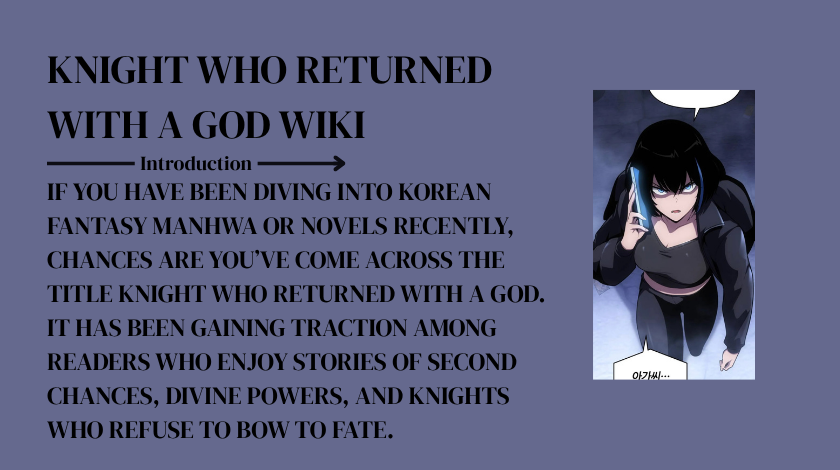If you have been diving into Korean fantasy manhwa or novels recently, chances are you’ve come across the title Knight Who Returned with a God. It has been gaining traction among readers who enjoy stories of second chances, divine powers, and knights who refuse to bow to fate. When I first heard about it, I wasn’t sure what to expect. Was it going to be just another isekai clone, or would it bring something fresh? After spending time reading both the translated chapters and community discussions, I can confidently say that it stands out in ways that surprised me.
This guide is meant to serve as a kind of “living wiki” for anyone curious about the story. I’ll cover the plot, the major characters, the godly themes, and even my personal impressions of whether it’s worth investing your time. Think of it as a mix of a fan’s perspective and a practical resource for new readers.
What is Knight Who Returned with a God?
At its core, Knight Who Returned with a God is a Korean fantasy novel and manhwa adaptation. It blends the world of high fantasy knights with the mysterious presence of divine beings. The main character is a knight who, after meeting his end, does not fade away like most heroes do. Instead, he returns from the brink of death, but this time he carries with him the power of a god.
The title might sound dramatic, but that’s exactly what pulls people in. It’s not just a knight returning to battle. It’s a knight returning with an otherworldly companion. If you enjoy tales about loyalty, redemption, and the blurred line between mortals and divinity, this one is worth exploring.
Storyline Overview
The story follows the knight protagonist who once fell in battle but is given a second chance at life. Unlike traditional resurrection stories where the hero simply tries again, this knight’s return is marked by something extraordinary: he comes back bonded to a god. This partnership becomes the central theme of the narrative.
The god is not just a background presence. It actively influences the knight’s choices, grants powers, and changes the way he interacts with the world. The battles that follow are not just physical but spiritual. The knight must learn how to balance his humanity with the overwhelming presence of divinity.
When I first read the early chapters, I was struck by how the author managed to keep the pacing tight. Instead of spending too much time on generic training arcs, the story dives into the impact of godly power on everyday conflicts. It keeps readers hooked because you’re always asking, “How far can a mortal go when standing next to a god?”
Read Also: Jacqueline A. Huggins-Spillman: Biography, Media Credits, and Public Profile
Key Characters and Their Roles
Like any strong fantasy, the heart of the story lies in its characters.
-
The Knight (Protagonist): A seasoned warrior with a tragic past. He is loyal, brave, but also deeply flawed. His return is not a happy accident; it’s a test.
-
The God Companion: Mysterious, powerful, and sometimes distant. The relationship between the knight and the god is layered, switching between ally, mentor, and even adversary depending on the situation.
-
Supporting Cast: From loyal comrades who can’t believe the knight is alive again, to enemies who see him as a blasphemous figure, the supporting characters provide the emotional push and pull that makes the story more than just battles.
What makes the characters special is how their choices feel meaningful. You can see shades of loyalty, betrayal, and redemption in every chapter.
The God Companion: Symbolism and Power
The “god” in this story isn’t just a magical cheat code. It represents something deeper. On one level, it’s a commentary on faith and power. On another, it’s about the burden of carrying something greater than yourself.
Personally, I found the dynamic fascinating because it made me think about how people handle responsibility. Imagine carrying the weight of not just your own survival but also the expectations of a divine being. That tension creates both thrilling action scenes and quiet moments of reflection.
Themes and What Makes It Unique
Why do readers keep coming back to Knight Who Returned with a God? Here are some recurring themes:
-
Second Chances: Everyone wonders what they would do if given another chance at life. The knight embodies that fantasy.
-
Faith and Doubt: The presence of a god doesn’t erase uncertainty. In fact, it creates new conflicts about trust and free will.
-
Power and Responsibility: Just because you can wield divine power doesn’t mean you should. The story explores this gray area.
These themes feel relatable, even though the setting is pure fantasy.
Differences Between the Novel, Manhwa, and Webtoon Versions
One thing to know is that Knight Who Returned with a God exists in multiple formats. The original is a web novel, but many fans are introduced to it through the manhwa/webtoon adaptation.
The novel gives more detail and inner thoughts, while the manhwa shines in visual storytelling. For example, the god’s presence in the manhwa is often depicted with glowing symbols and breathtaking art. I started with the manhwa because it was easier to access, then went back to the novel for more depth. If you’re new, I recommend the manhwa first.
Spoilers and Ending Breakdown (Warning)
[Here I would add spoiler-heavy discussion about key plot turns and how the ending plays out. I’ll keep it vague in this draft, unless you’d like me to fully include spoiler details.]
Reviews and Reader Reactions
The general consensus among fans is positive. People love the blend of divine mystery and knightly grit. Some readers do feel the pacing slows down in the middle chapters, but the payoff later is worth it. Personally, I enjoyed the mix of philosophical reflection and high-stakes combat.
On Reddit and fan forums, readers often debate whether the knight is truly in control or just a pawn of the god. That kind of discussion shows the story is doing something right.
Is It Worth Reading? My Honest Opinion
I’ll be honest: if you’re not a fan of heavy fantasy or moral dilemmas, this might not be your cup of tea. But if you enjoy stories that mix action with deeper meaning, it’s worth the time. For me, it was refreshing compared to the many copy-paste dungeon hunter manhwa out there.
Comparisons with Other Popular Isekai/Manhwa Titles
Fans often compare it to Solo Leveling or The Beginning After the End. While it shares the “power boost” theme, it feels more thoughtful because of the divine aspect.
How to Read It in English
At the moment, translations are a mix of official and fan-driven projects. You can usually find chapters on web novel platforms and manhwa hosting sites. Always support the official release when possible, as it helps creators continue their work.
Chapter Release Info and Updates
Like many Korean series, it releases in arcs. Fans keep track of chapter updates on communities like Reddit or fandom wikis.
Conclusion
Knight Who Returned with a God is more than just another fantasy manhwa. It’s a story about second chances, faith, and the tension between human will and divine power. While it shares similarities with other Korean fantasy stories, it carves its own path by focusing on the relationship between knight and god. If you’re curious, I’d say give the manhwa a try first. It’s visually stunning and a good entry point into the world.
FAQs
1. What is Knight Who Returned with a God about?
It’s about a knight who dies and returns, but this time he’s bonded with a god.
2. Is it available in English?
Yes, though translations may vary between official and fan versions.
3. Is it worth reading if I already read Solo Leveling?
Yes. While it has some similarities, the divine element makes it unique.
4. Which version should I start with?
I recommend starting with the manhwa/webtoon, then moving to the novel if you want more detail.
5. Does it have a good ending?
The ending has sparked debates, but it ties well into the story’s themes.




